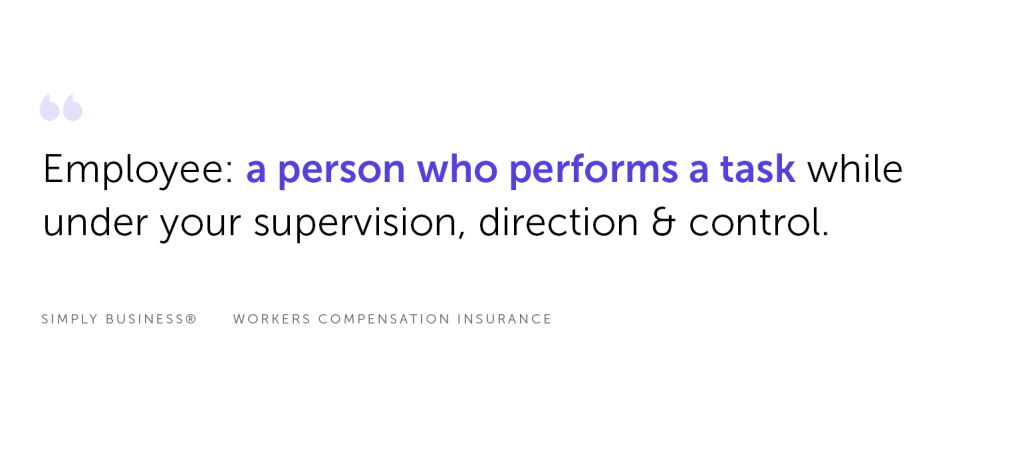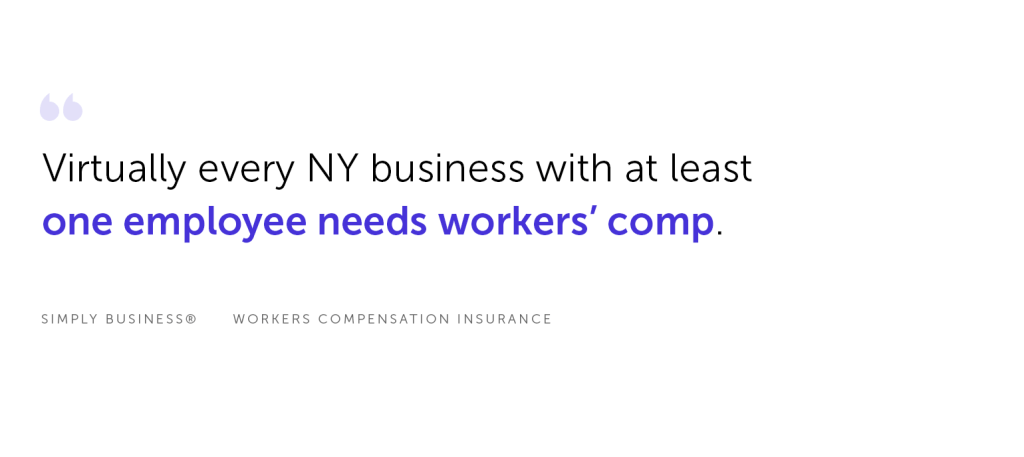New York Workers’ Compensation Insurance
Running a small business in the Empire State? Check out our guide to workers’ compensation insurance in New York.
Simply Business is pleased to provide tailored insurance options from:
The Empire State. The Big Apple. The Capital of the World. Everything sounds big in New York. Even when it comes to small businesses.
According to the U.S. Small Business Administration, there are 2.3 million small businesses in New York. They employ over 4 million people, accounting for almost half of the state’s employees.
That’s a lot of people. And if you’re a small business owner, it’s also a lot of responsibility. That’s because New York has a workers’ compensation law in place to take care of your employees if they get injured or become sick on the job. And a Workers’ Compensation Board (WCB) to ensure that you’re following the rules.
That’s why we wrote this article. It covers all you need to know about workers’ compensation insurance in New York, including:
- Requirements
- How to get it
- Proof you have it
- And more
Let’s get to it.
Is Workers’ Compensation Insurance Required in New York?
Yes. If you have any employees — even if it’s only one and it’s a family member who works for you part time — you are required by law to have an active workers’ compensation insurance policy in place.
Of course, there are a few exceptions, depending on the type of business you run. If you’re a sole proprietor, LLC, LLP, or partnership with no employees working for you, then workers’ compensation insurance is not required.
However, you may want to read up on why it’s still a good idea to get it. For example, if you’re a sole proprietor in New York with no employees — or subcontractors that you hire occasionally — you may need workers’ compensation insurance to land jobs in certain higher-risk fields, such as construction or roofing.
Who is considered an employee?
An employee is generally defined as a person who performs a task for your business while under your supervision, direction, and control. That person doesn’t have to be working for you full time to be considered an employee. They also can be part-time, temporary, seasonal, a day laborer, leased, or borrowed. More on that in a bit.
If you want to learn more about who is considered an employee under the workers’ comp law, check out one of the links below:

How to Get New York State Workers’ Compensation Insurance
There are three ways to get workers’ compensation insurance in New York:
1. Apply through the New York State Insurance Fund (NYSIF)
The NYSIF is a public insurance carrier run by the state of New York. They offer workers’ compensation insurance to any employer needing coverage. Policies are available for businesses of any type or size and with any safety record.
2. Self-insure in New York
The option of self-insuring in the state of New York isn’t for everyone. Mainly because to qualify, you need to put up cash in advance to cover potential claims. And usually it’s a lot of cash. If interested, you can read up on eligibility requirements and the application process here.
If approved, you must agree to meet all obligations under WCB laws, including making benefit payments to employees if they miss work due to injury or illness. You’ll also be required to maintain an adequate security deposit in the event of a default.
3. New York private business insurance carrier
Shopping around for a policy that best fits your business needs is often the popular choice. And wouldn’t you know it, that’s where we can help. At Simply Business, we make it fast and easy to get insured.
Check out our free quote tool. In just 10 minutes or less, we can help you find what you need to meet your state’s workers’ compensation requirements.
Certificate of Workers’ Compensation Insurance New York
A certificate of insurance (COI) provides proof that your business is protected in the event an employee gets injured or sick as a result of working for you.
It’s also great to have, because it can help you demonstrate to third parties that you have your legally required coverage. For example, if a government contract requires you to have workers’ comp insurance, showing your certificate of coverage could help you land the project.

Cost of New York State Workers’ Compensation Insurance:
The question that’s probably top of mind for you is: How much is Workers’ Compensation Insurance going to cost me? The honest answer is: it all depends. Keep reading and I’ll explain why.
New York State Workers’ Compensation Insurance Rates
The reason there’s no set workers’ compensation rate is that every business is unique, and rates are determined by a number of factors, including:
What your business does.
Some industries are riskier than others. The higher the risk of injury your employees face in your line of work, the higher the workers’ comp rate you can expect to pay.
In fact, every state has what’s called “Class Codes.” They’re used to determine rates. For example, if you own a business that installs fences, your class code would be different from, let’s say, the excavating business that graded the land before you installed the fence. Want to know what your class code is? You can search for it here.
Your payroll.
Your annual payroll can be part of the price determination as well. So when shopping for workers’ comp insurance, it’s helpful to have your payroll information at hand.
Your claims history.
If you’ve had workers’ compensation claims in the past, that also could play a role when determining your premium price.
Once you purchase your policy, you should be issued a certificate as proof that your business has coverage.
New York State Workers’ Comp Requirements
When it comes to workers’ compensation insurance, each state has its own regulations. And each business has its own unique situation.
For example, let’s say you’re a florist who employs a family member. Or a baker who hires interns from a local culinary school to help during the summer months and busy holiday seasons. Because they work for you, you’re required to have workers’ compensation insurance.
However, let’s say you’re a beauty shop owner who rents space to a hair stylist on a monthly basis. This space includes the chair, sink, and amenities. However, the stylist sets her own appointments and has h

New York State Workers’ Compensation Insurance Requirements
When it comes to workers’ compensation insurance, each state has its own regulations. And each business has its own unique situation.
For example, let’s say you’re a florist who employs a family member. Or a baker who hires interns from a local culinary school to help during the summer months and busy holiday seasons. Because they work for you, you’re required to have workers’ compensation insurance.
However, let’s say you’re a beauty shop owner who rents space to a hair stylist on a monthly basis. This space includes the chair, sink, and amenities. However, the stylist sets her own appointments and has her own license, tools, and products. Based on this scenario, the stylist is generally not your employee. Consequently, you are not required to have workers’ compensation insurance.
Of course, your situation might be vastly different — or even slightly different. So to help you navigate the different scenarios that can determine the coverage you need, here are some helpful links by worker type, business type, and situation:
Worker type
Business type
- Farms
- For-profit businesses
- Independent contractors
- Nonprofits with employees
- Nonprofits with no employees
- Partnerships, LLCs, or LLPs
- Sole proprietorship
- Musician/performing artists
- Car services
Situation
- New York employer working outside New York
- Out-of-state employers whose employees work in N.Y.
- Out-of-state employers with employees who live in N.Y. but work elsewhere
It can be a lot to absorb when you see a list of different possibilities like this, but don’t worry — you don’t have to absorb them alone. At Simply Business, we’re here to help.
We work with insurers to offer insurance policies tailored to your industry’s specific risks. We do this by taking the time to understand your business, so you can get a policy that protects you and your employees.
Best of all, we make it fast and easy to get insured. I mentioned our free quote tool earlier. To get a quote, it usually takes under 10 minutes, and we can take it from there. Or if you want to talk to a helpful human (one of our licensed insurance agents), you can give us a call at 855-930-2844.
Who Needs New York State Workers’ Compensation Insurance?
New York requires virtually every business that has employees to carry workers’ compensation insurance.
If you have just one employee working for you, you need to have it. If that one employee is a family member, you need to have it. If that one employee is a family member working only part-time, you still need to have it.
Also, here’s something else to consider. A workers’ comp insurance policy is about so much more than just meeting your state’s requirements. Having the policy also can:
- Protect your business’s finances in the event a claim is filed
- Prevent your business from being wiped out by a catastrophic claim
- Pay for legal fees if you need to defend yourself against a lawsuit
- Build trust with your employees
- Give your employees a sense of security that they’ll be taken care of should the worst happen
- And more

Do Independent Contractors Need New York State Workers’ Compensation Insurance?
Business owners in New York State are required to carry workers’ compensation insurance if they have employees.
However, it’s important to note that in New York, employers are not required to provide workers’ compensation insurance to individuals they hire as independent contractors.
Of course, the distinction between who is considered the employer and who is considered the independent contractor can be fuzzy at times, especially in the construction and trucking industries.
So here is a link to help you identify who’s who.
Penalty for Not Having New York State Workers’ Compensation Insurance:
Failure to carry workers’ compensation coverage for your employees could lead to stiff penalties, including, but not limited to:
Civil penalties
- $2,000 fine for every 10 days you go without it
Criminal penalties for five or fewer employees
- Misdemeanor punishable by a fine of between $1,000 and $5,000
Criminal penalties for more than five employees
- Felony punishable by a fine of between $5,000 and $50,000
Subsequent failure to secure coverage could lead to additional penalties and fines — not to mention additional liabilities.
For example, let’s say you just started your own small painting business and have two crew members working for you. Business is going great right out of the gate. So great that insurance is the last thing on your mind. Until one of your painters gets hurt on the job, misses work, and files a workers’ comp claim. If you’re uninsured, it could prove costly. That’s because the following “additional liabilities” could come out of your own pocket:
- Lost wages and medical benefits awarded to your employee
- Legal representation to defend against a workers’ comp claim
- $2,000 fine for every 10-day period of noncompliance
- Potential additional penalties assessed by New York’s Workers’ Compensation Board

And that’s not all. If the injured employee sues you, you could face additional out-of-pocket expenses, including settlements and attorney’s fees.
Nanny Workers’ Compensation Insurance Exemption
Typically, if you hire people to work for you full time and they’re not business owners themselves, such as a household worker, gardener, care worker, or nanny, you almost certainly need workers’ compensation for them.
For example, let’s say you hire a live-in nanny to care for your kids. The nanny sleeps and eats there. Runs errands. Performs other duties. And generally works more than 40 hours per week. In this case, workers’ compensation is required.
However, workers’ compensation is not required if your nanny works fewer than 40 hours for you per week and doesn’t live with you. In this case, the nanny is considered a casual laborer.
Affidavit of Exemption for Workers’ Compensation Insurance in New York
As mentioned earlier, if you own a business in New York with no employees, you are not required to have workers’ compensation insurance.
The same goes for if you own a business outside of New York but need a permit, license, or contract in New York to get that job done. As long as all the work related to that permit, license, or contract happens outside of New York State, New York workers’ compensation is not required.
However, in both cases, you may still need to prove it with an affidavit or certificate that shows you are exempt. It’s called a Certificate of Attestation of Exemption. You can learn more and apply for it here.
Final Word
Taking care of your employees with workers’ compensation insurance is not only the right thing to do, it’s the law in New York.
Fail to follow it — even unintentionally — and you could face big problems — both legally and financially. Hopefully this article can help you avoid those pitfalls.
After all, your business may be small, but it means the world to you.
Workers’ Comp Information in Other States
Simply Business has state information for workers’ compensation insurance in California, Colorado, Florida, Georgia, Illinois, Maryland, Minnesota, New Jersey, New York, North Carolina, Pennsylvania, Texas, Wisconsin.